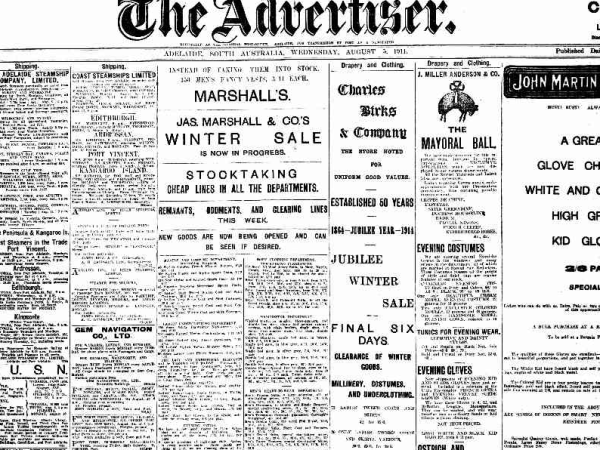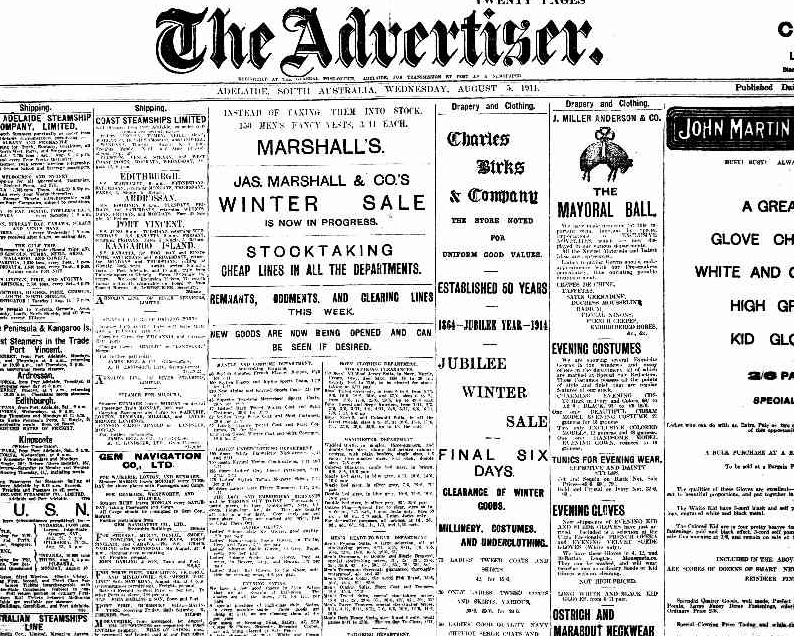Advertiser – August 1918
1 August 1918 p5
The Czar’s last moments: a pathetic end
London July 30th .The ‘Lokal Anzeiger’ (Berlin) has obtained from a highly placed Russian particulars of the Czar’s last moments. Awakened at 5 o’clock in the morning by a patrol consisting of a non-commissioned officer and his men, he was told to dress. He was taken to a room where the Red Guard’s decision was communicated to him, and be was allowed two hours to prepare for his end. He received the tidings with great calmness, returned to his bedroom, and sank to his chair. Then he asked for a priest, who was allowed to remain with him for some time.
The Czar wrote several letters. An escort came at 6 o’clock to take him to the place of execution He tried to rise from the chair, but was unable to do so, and the priest and a soldier helped him downstairs. The Czar at once fell to the ground and was unable to stand without support. He was put against a post. He raised his hands and appeared about to speak, and then the rifles rang out and Nicholas fell dead.
8 August 1918 p5
Experiences of a prisoner of war
Private Tomley, who has been a prisoner of war in Germany, writing from London to his friends in Adelaide, gives interesting particulars of his experiences. He says he was captured near Bullecourt on April 11, 1917. He was wounded in the left shoulder, and lay in a shell-hole until about 5 o’clock in the afternoon, when he tried to return to obtain help for three other wounded men. He was captured by a German officer, who pointed a revolver at him. He was taken … to Humlaucourte. The men were placed in school buildings, churches, and halls. The German doctors worked hard all night attending to the men, of whom there were some hundreds, but Private Tomley’s turn for attention did not come till the following night… On the third evening he was taken to a hospital, where they were put under a shower with all their bandages on, and were then carried straight into bed with their wet things on, and left for three days. At the end of this time German sisters attended the writer, and were very good to him… The cooking there was “awful”, the sanitary arrangements were bad, and it was a matter of luck whether a patient healed or died. “…We got soup and something they call coffee twice a day, and two small pieces of bread. They get parcels of food, however, from the British relief committee, which were the means of saving the lives of many of them.”…
21 August 1918 p7
Mr. Peter Waite: Another munificent Gift
When the Hon. A. H. Peake was Premier in 1913 he had the pleasure of announcing … that Mr. Peter Waite had generously decided to hand over to the University his Urrbrae house and grounds… At the same time Mr. Waite, in his letter to the Premier, offered to the Government part section 250, containing 114 acres, for the purposes of an Agricultural High School. This land adjoins Urrbrae. The offers were accepted….
21 August 1918 p7
Good general rain: Wheat areas benefit
… on Monday rain was recorded throughout South Australia. A gratifying feature was the splendid fall over the northern agricultural areas, parts of the West Coast, and Yorke Peninsula, where in most instances registrations were between half an inch and an inch… Nice rains had been recorded over the dry Murray Flats, where a fall was urgently needed, but in the South-East the-rain was light.
Shortage of recruits: Inadequate enlistments
A very serious situation has arisen in regard to recruiting. For a long time past the Australian forces in the field have been suffering from a lack of reinforcements. To-day, notwithstanding the creation of huge recruiting organisation and the expenditure of very large sums of money, the rate at which recruits have been enrolled is not more than 3,000 a month… The inadequate enlistments in .Australia have begun to have their effect on the forces in the field. It has been impossible to maintain the divisions intact. Historic battalions have had to be withdrawn from the firing line and members of these units utilised as reinforcements for other battalions.



